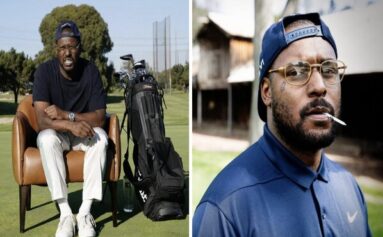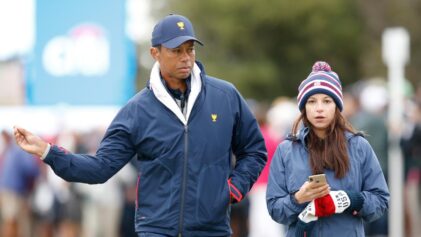As the dark clouds gathered over proud Augusta National Golf Club on Sunday afternoon, world No. 1 Tiger Woods probably couldn’t appreciate the irony of it all. How, like vinegar to a man dying of thirst, the impending rain would only serve to extend the most talked about drought in sports. With the possible exception of the hapless Cubs’ futile effort to land a spot in the World Series, that is.
Woods is now winless in his last eight Masters and hasn’t inched any closer to Jack Nicklaus’ record 18 major championships since he notched No. 14 on a broken leg in the 2008 U.S. Open at Torrey Pines.
Tiger actually began his Joe Btfsplk (the rain cloud-tormented character from the comic strip Li’l Abner) experience on the par-5 15th hole of the second round. That’s when his near-perfect approach shot caromed off the flagstick and into the pond fronting the green. What ensued produced a firestorm of controversy that surely eclipsed one of the most dramatic finishes in Masters history with Australian Adam Scott holing an in-your-face putt on the second playoff hole to defeat Argentine Angel Cabrera, himself a playoff victor four years ago among the lengthening shadows at Augusta National.
Not only is it 32-year-old Scott’s first major title, it’s the first green jacket donned by an Aussie. And plenty from Down Under had come agonizingly close over the years, including his countryman and idol, Greg Norman, perhaps the most tragic hero in the often-cruel amphitheater of golf’s major dramas.
But back to Tiger and the controversy that might cast a pall over this Masters as long as high-definition-armed TV viewers are allowed to call out every rule-breaker, perceived or otherwise, from the comfort of their nests like vultures waiting for some unfortunate victim of road-kill. That’s what happened to Tiger late Friday afternoon as he was charging up the leaderboard.
After the astonishing bad luck, Tiger was faced with three viable options under the rules that govern the game. For his fourth shot, he could drop in the designated area; or he could drop as far back as he desired along the line where the ball last crossed the hazard; or he could return to the area where he hit his approach and drop the ball “as close as possible’’ to that spot. With caddie Joe LaCava planted near the original spot, and after surveying the drop area, he returned to the original spot, dropped his ball and played a remarkable shot that behaved precisely how he had envisioned the ill-fated first one. It took two bounces and skidded to a screeching stop some four or five feet from the cup. Tiger converted the bogey putt and escaped what could have been a calamitous result. Or so he, the gallery and millions more watching on TV thought.
Enter the armchair-rules official. He or she, reportedly, alerted Masters rules officials that Tiger might have broken a rule in making the drop. They reviewed tape of the incident and cleared Tiger of any infraction. Case closed, right?
Not so fast. In his post-round interview with ESPN, the accused indicted himself, vividly explaining how he dropped the ball two yards or so farther back from the original spot and geared down his swing a smidge to dial in the perfect distance. Then, Elvis left the building and settled into his Masters digs a short drive away, where he would attempt to put the whole affair behind him and ready himself for moving day. At three-under, he was still within striking distance of halfway leader Jason Day (six-under).
Or so he thought.
Rules officials received another call, reviewed Tiger’s comments and contacted him through his agent Mark Steinberg. During an early Saturday morning meeting, Tiger was informed that he had indeed violated the rules but would receive a reprieve under a two-year-old rule instituted to protect a player from himself and the HD prosecutor. There would be no disqualification for signing an incorrect scorecard; just a two-stroke penalty, giving him an 8 on the hole and a 73 for the round instead of a 71.
In the interim, bloggers, tweeters and other social media opined about the incident – many of them calling for Tiger’s head. However, the most profound rush to judgment might have come from TV’s talking heads, notably, three-time Masters champ Nick Faldo, who flatly stated that Tiger should be DQed or do the manly thing and DQ himself for the good of the game. At worst, he would earn enough PR brownie points to fill a trophy case.
Even after all the facts were in, some still called for him to withdraw because he had, in their opinion, willfully gained an advantage on the field by making an improper drop, thus improving his lie.
Woods did neither. Instead, he tweeted about the incident and sauntered onto the grounds for his routine pre-round warm-up as if nothing had happened.
I, for one, don’t blame him. The whole incident could have been avoided had the rules committee informed Tiger of a potential problem before he signed his scorecard, as is normal operating procedure on the PGA Tour. Admittedly, they had time to do so but decided, after reviewing the tape, there was no need to bother a competitor about an unfounded accusation.
So the green jackets must bear a share of the looming dark cloud.
But there’s also the matter of the kneejerk reaction of pundits, who spewed critical analysis doused in venomous words like “honor,” “integrity” and “justice.” Words that had even the casual golf fan up in arms. Words that mean little when put in historical context of the game’s dubious past.
Where were they when the game discriminated against minorities and women with a rule that allowed only Caucasian males membership in the organization that ran professional golf, thus also keeping them from competing in sponsored events – for 27 years? Just because, this time, the rules worked in favor of a minority, that doesn’t make the participants all-square and force a playoff to determine the most righteous.
Tiger and LaCava must accept some culpability in the ignition of the firestorm. It begs the question: Why did neither of them know the rules? Also, why didn’t either think to ask the rules official assigned their pairing? Especially since they faced a similar situation earlier this season in Abu Dhabi?
Though understandable, shell shock is hardly an acceptable excuse. And he didn’t blame the incident for his inability to catch Scott and Cabrera (he finished four strokes out of the playoff, the same number the bad-luck shot cost him). Making excuses is not in his DNA.
“I played well,” he said. “Unfortunately, I didn’t make enough putts and I missed a few shots here and there. I thought if I shot 65 I would have won it outright and it turns out that might have been the number.”
So, what should have been the celebration of 14-year-old Chinese phenom Tianlang Guan becoming the youngest player to make a cut in major championship history (finished 12-over-par, ahead of three pros) and the long-awaited coronation of Scott as a major champ, was instead shrouded in controversy.
Some believe the 2013 Masters, and Tiger’s heretofore, glorious legacy achieved inside the ropes, will forever be tainted by the controversy. I don’t agree. Hopefully, future focus will not be on what should have been a non-issue, but on the myriad more palpable storylines…because in the end it proved just that.
In the words of national treasure Stevie Wonder, who surely has more wisdom than his sighted brethren, “What the fuss.’’



